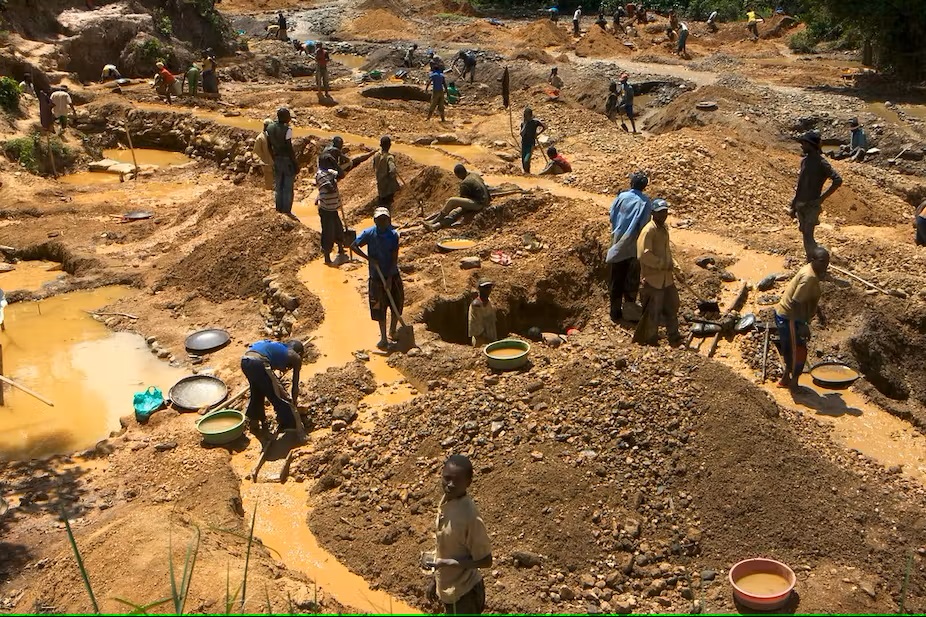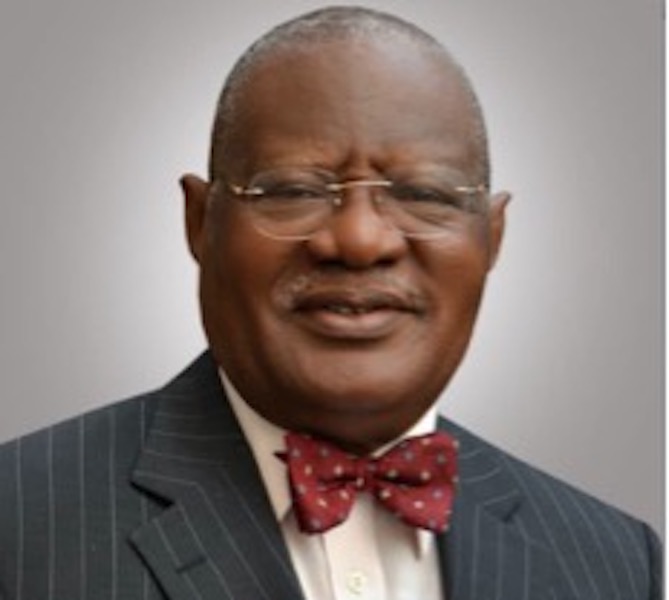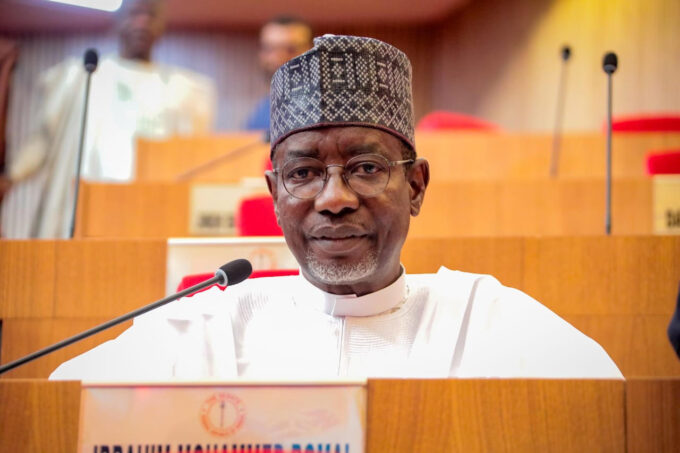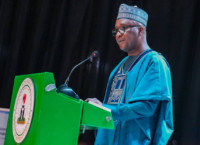JOE EDET suggests measures to curb the scourge of illegal mining
It is no secret that Nigeria is endowed with so many Mineral resources. There are about 44 different minerals spread across the nation. Cross River State alone has about 24 minerals namely Salt, limestone, coal, manganese, mica, ilmenite, gold, quartz, glasssand, tourmaline, petroleum, natural gas, kaolin, mica, clay, spring water, talc, granite, galena, cassiterite, goethite, uranium, barites. Sadly, though, it was reported in November 2015 by a Senator that Nigeria lost N8 Trillion in two years due to illegal mining and exportation of unprocessed gold. In developing countries like Nigeria, minerals are mostly extracted by artisanal, small scale and illegal miners. Their activities are hardly or never regulated by government agencies. It might be on the increase because it attracts energetic young people due to its lure and promise of quick money.
Though the activities of illegal mining might happen in just a matter of days or hours, their destructive effect can affect many generations through time. Some of the alarming effects of illegal mining include: Pollution from runoffs of mining activities can kill organisms. For example, when illegal miners use liquid mercury to extract gold without the proper technology used in the process, nor any protection for workers or the environment, it is hazardous in that when mercury is dumped into the environment, and dumped as effluents into fishing rivers, it finds its ways into the fish which is in turn consumed by humans. This causes Mercury poisoning which causes infertility, heart problems, and even death of the fish. Another form of poisoning is Cyanide poisoning. In 2010, one of the worst cases ever of lethal levels of lead poisoning was discovered in Zamfara State, when 43 villages showed lead poisoning effects. Over 400 children died from the scourge due to unsafe and illegal mining of gold in the state. Illegal sand and laterite mining has led to erosion, flooding and the consequent loss of property by residents in the State.
Illegal mining processes can also cause siltation which is the pollution of water by particulate terrestrial clastic material, with a particle size dominated by silt or clay. Siltation is most often caused by soil erosion or sediment spill.
The activities of illegal miners robbed the country of its wealth especially in the face of dwindling oil prices as they operate without recourse to cost and they pay no taxes or royalties or in some cases pay the incorrect values, since there is no proper regulation of their activities.
Environmental degradation is unavoidable as the illegal operators cause accumulation of chemicals and poisons, damage lands, especially arable ones, lead to the formation of gullies, cause deforestation, pollute water sources, delay the growth of the host communities and take away their sources of livelihood, especially as most people in Cross-River are farmers.
Illegal miners use explosives and do not remediate their mining sites, thereby leaving dangerous chemicals freely exposed to the environment. This is often in violation of S. 99 (2) of the Mining and Minerals Act, which prohibits the use of explosives in extracting sand, clay, laterite, etc.
Tin miners will often sink mine pits to exploit tin and will not close them after the operation. Quarry companies rarely involve in reclamation which is the process of creating new land or returning disturbed lands to an improved state. In Canada, reclamation is defined as ‘the process of reconverting disturbed land to its former or other productive uses’. In Oceania, it is frequently referred to as land rehabilitation. Conflicts will often break out among communities or groups over ownership of the mined lands since the proper process of authorizing ownership of the land was not followed. Miners are often killed due to poor operational facilities and working conditions and little or no safety precautions for mining explosives are observed.
Communities are deprived of the development that should accrue to them because artisanal miners do not operate based on laid down rules and legislation. The Minerals and Mining Act mandates a Community Development Agreement approved by the Mines Environmental Compliance Department but this is denied to the host communities.
Mining companies are supposed to provide jobs for Nigerians, especially under the Local Content Act, but the jobs are taken by foreigners and the local industries complying with the law and employing 100% Nigerians are faced with stiff competition.
Illegal mining can cause unfair pricing advantages. Due to the often crude methods used by illegal miners, the minerals extracted are inefficiently exploited and processed. An Environmental Impact assessment is supposed to be done on the land and also mitigation plans put in place but these are never followed or adhered to by illegal miners.
Labor laws are usually disregarded and there are the vexed cases of child labour and women labour. There is a school of thought that small-scale mining activities should be encouraged by providing them with incentives, access to facilities and programs to encourage safe mining processes and effective remediation of the environment, and providing modern mining tools to reduce the pollution of the environment and hazards to their health and the environment.
Artisanal miners should come together to form cooperatives which can also have government supervision and backing. It will be easier for them to pursue their interests collectively and lobby the government to support them. A task force or mining police should be established to arrest persons engaged in illegal mining. This will also employ our teeming youths. The government should begin to make it clear to traditional and community leaders that they will be held responsible for allowing illegal mining activities to go on unreported or undisturbed. On the other hand, also, they can be trained to spot these activities and report them. Of note is the fact that S. 19, Minerals and Mining Act 2007, establishes the State Mineral Resources and Environmental Management Committee whose function is to advise the Local Governments on the implementation of programs for environmental protection. The government can take steps to close down illegal mines, confiscate equipment, revoke the licenses of illegal miners and sanction them.
It can increase physical and electronic security, create intelligence channels to be more informed on secret mining activities, and create a whistleblowing mechanism to enhance the flow of information. Collaborate with and train security and regulatory agencies, communities and businesses to identify and report illegal miners, perform impromptu raids and strengthen checkpoints.
Very importantly, the government should provide alternative employment given the fact that unemployment is one of the leading causes of illegal mining.
On a futuristic note, the government can take a feather from the Indian Government, which is already employing the use of satellite data to stop illegal mining by using remote sensing satellites and tracking the legal boundaries of mined areas. It has been suggested that Mineral Buying Centers be established at sites where mining activities happen. The federal government should fix the rates of the minerals so that foreign mining companies buy from these local producers at a fixed price. A data-gathering process should be put in place. Unscrupulous powerful people and crime syndicates sponsoring these activities should be fished out and sanctioned. Incentives should be given to investors in that area to enhance the availability of capital to the miners. Promoting research to enhance productivity and minimize hazards. These measures will go a long way to reducing, and eventually, stopping illegal mining in the state. Given the above-discussed suggestions, the following actions are suggested. The government should organize regular training programs in partnership with technical experts to educate the regulatory authorities on evolving methods which are being used to steal the oil and also modern ways of apprehending the tankers in which the oil is being carted away. A Whistle-blowing mechanism should be set up in all the wards of the country for people to report suspicious illegal mining activities to the head authorities anonymously and without fear of victimization. A dial-up number or mail address could be established to that effect.
The community as a collective body should take action against all illegal miners. A Monitoring Team should be Constituted and empowered, in conjunction with the oil companies, the Neighborhood watch, the Nigerian Security Civil Defense Corps and individuals renowned by their community for their integrity should be commissioned, to patrol and be on the alert for illegal mining activities and to seize the equipment and illegally obtained minerals from the perpetrators. Pipelines and mines should be located or relocated very far from residential areas such that illegal miners or oil vandalizers are isolated, thus making them far easier to apprehend.
In taking advantage of the possibilities of Satellite sensing and surveillance, the state government and its academic and technical institutions should partner with the National Space Research and Development Agency. A transparent system should be put in place such that all transactions in oil and other mineral resources are well documented and identified to make for easy identification of stolen oil and produce. A Partnership with the Central Bank of Nigeria and other Financial Institutions should be established to fund small-scale miners to purchase modern implements and equipment. There should be an established MINING DEVELOPMENT BANK with the capacity to grant loans and facilities with zero interest to artisanal miners. The war on illegal mining, long though it may be, is not an insurmountable problem. It is hoped that with the recommendations advanced in this analysis, the government can reposition itself to reap the benefits that abound in its mineral resources sector.
Edet, Vice Chancellor, Arthur Jarvis University, was formerly the Senior Special Adviser and Consultant on Mineral Resources to Cross River State


















Leave a comment